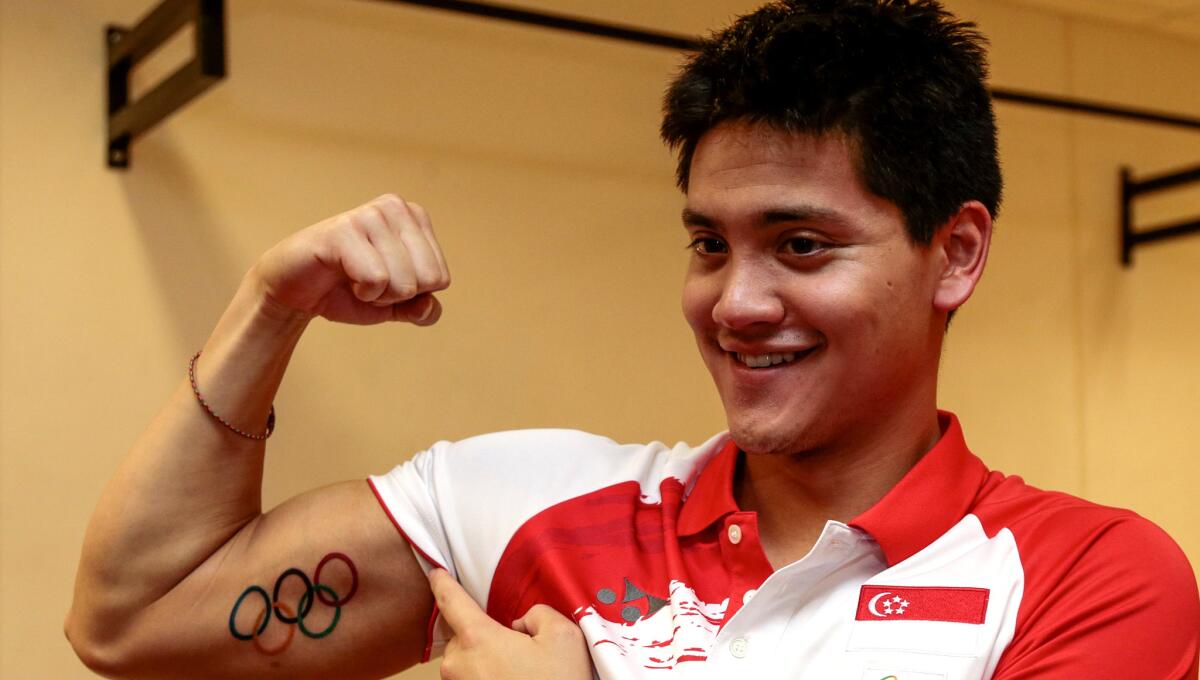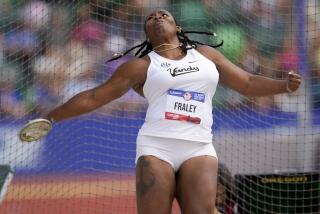The buzz: The price of a medal, another fine mess and a gender crisis in canoeing

- Share via
Reporting from Rio de Janeiro — A look back at Day 15 of competition at the Rio Olympics.
They say it’s wonderful
So you’re a talented athlete and you have in your background the ability to shop for a country. Sort of like the Qatar handball team, where 11 of the 14 members really aren’t from that small Arabian Peninsula country.
Where would you go?
Singapore seems like a good choice. Once you get over the fact it’s actually a country and not just a city, you learn how well it treats its Olympic athletes.
Ask Joseph Schooling, gold medalist in the 100-meter butterfly. The Singapore Olympic dudes give gold-medal winners $750,000. Finish second and its $380,000. A lowly bronze is $190,000.
Bordering Malaysia is not too shabby. Its payouts are $250,000, $75,000 and $25,000.
Now let’s compare that to the good old U S of A., where a gold is worth $25,000, a silver is $15,000 and with a bronze you pocket $10,000, minus taxes, of course.
Azerbaijan and Kazakhstan each pay $250,000 for a gold, but the secret bank account nation of Switzerland pays only $83,000.
My defenses are down
Bad behavior should never be condoned, but do you get the sense that officials in Brazil are trying to make up some of their huge Olympic shortfall by fining foreign athletes?
We know the story of Ryan Lochte sidekick Jimmy Feigen, who was fined about $11,000 only to have prosecutors appeal to a judge that the fine should be about $47,000. In fairness, the original $11,000 was supposed to go to a sporting charity. Is Rio 2016 a sporting charity?
Well, on Friday night, 10 members of the Australian Olympic team were, as an Aussie journalist described to IOC president Thomas Bach, “frog walked” out of the arena for allegedly falsifying their credentials to get better seats to watch the men’s basketball team.
OK, it’s wrong, but is it criminal?
No one was charged, but a judge on Saturday said it would all go away for the price of $3,100 an athlete. Nine of the 10 were fined, none were charged, and the Australian Olympic Committee issued an apology.
I’ll share it all with you … not
Remember Annie Oakley in “Annie Get Your Gun,” belting out the words “Anything you can do, I can do better?” Well, apparently that doesn’t work when it comes racing a canoe, at least, according to some male canoeists.
The Associated Press, either straight faced or tongue-in-cheek, wrote perhaps one of the funnier lines of the Games. “…gender equality remains an unsettled issue in canoe sprint.”
The latest conversation on this started when a silver-medal Slovakian canoeist said women just aren’t good enough to make this a medal sport. A German paddler agreed. A Czech compatriot joked that it would hurt women’s posture.
There might be something below the surface other than a paddle. In order to add two women’s canoe events, they had to cut two men’s races.
It’s really one of the great things about the Olympics, where for two-plus weeks you can talk with authority about things you have absolutely no clue about. Conversations about rhythmic gymnastics, the new kicks introduced in taekwondo and the proper baton handoff come with such ease, all to be forgotten Monday.
Got the sun in the morning
The gold-medal winning Fiji men’s rugby sevens team arrived back home Sunday (remember the international date line) to lined streets and an official welcome ceremony at Prince Charles Park.
Their route, the kind seemingly preferred by corporate travel agencies, was from Brazil to Santiago, Chile, to Auckland, New Zealand, and finally to Fiji. The island is hoping one day United will make it a hub.
The celebration is supposed to go on for a few days and Monday was declared a national holiday, much like Brazil did so that all those darn foreigners would go back home and make gas stations safe again.
Each player on the Fiji team will be awarded $30,000.
john.cherwa@latimes.com
Help provided by Times staff writers Kevin Baxter, Lisa Dillman, Helene Elliott, Nathan Fenno, Bill Plaschke and David Wharton.
More to Read
Go beyond the scoreboard
Get the latest on L.A.'s teams in the daily Sports Report newsletter.
You may occasionally receive promotional content from the Los Angeles Times.





